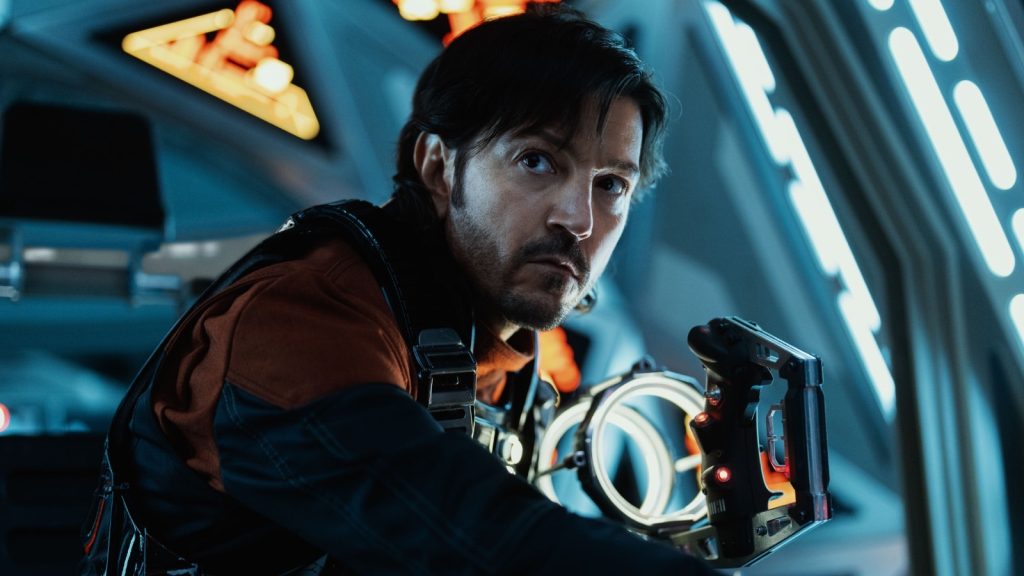A year after the unrest in Ferrix, Cassian Andor (Diego Luna) has become a vital figure in the rebellion, coinciding with the Empire’s preparations to deploy the Death Star.
Episodes viewed: 12 of 12
The first season of Andor captivated both Star Wars newcomers and seasoned fans alike. By delving into the story of an overlooked character from a prequel spin-off, it exceeded all expectations, exploring Cassian Andor’s (Diego Luna) transformation from petty thief to dedicated revolutionary. The upcoming second season continues this narrative arc, detailing Cassian’s journey as he integrates into Luthen Rael’s (Stellan Skarsgård) network of rebels, leading up to the events of the 2016 film Rogue One. Despite knowing the eventual outcome, the storyline unfolds with urgency and is crafted with remarkable quality.
Set four years prior to the Battle of Yavin, the second season kicks off with Cassian stealing an Imperial test ship, only to be ambushed by a group of aimless rebels. Meanwhile, Bix (Adria Arjona), still haunted from her Season 1 ordeal, is in hiding in the outer rim with her droid B2EMO. Imperial supervisor Dedra Meero (Denise Gough, again delivering a standout performance) is being recruited by the merciless Director Krennic (Ben Mendelsohn) for a project on Ghorman, while dealing with power-hungry Syril (Kyle Soller). Senator Mon Mothma (Genevieve O’Reilly) juggles preparations for her daughter’s wedding with the increasing tension in her political sphere. The season progresses in three-episode arcs, each propelling the plot forward by a year, edging closer to Cassian’s final mission at the Ring of Kafrene.
The first season of Andor acted as an awakening not only for Cassian but for those around him and the rebellion itself. In contrast, the second season presents a stark examination of the sacrifices and selflessness required to combat the oppressive, corrupt forces wielded by the Empire, drawing unsettling parallels to real-life issues. It highlights the need for individuals to relinquish personal connections for the communal good. From Cassian to the wider cast, including Mothma, Dedra, Luthen’s assistant Kleya (Elizabeth Dulau), and fellow rebel Vel (Fay Marsay), everyone is given their moment to shine, with all feeling the ramifications of their roles in this brutal conflict. Characters in Andor often find themselves faced with the grim choice of fighting against what they despise or protecting what they cherish.
Diego Luna’s portrayal of Cassian conveys the weight of responsibility he carries. He embodies a character torn between the urge to resist fighting and the daunting call to action, leading to numerous clashes with the increasingly militant organization of the Alliance. His relationship with Bix is further developed both on and off-screen, which deepens the impact of his eventual fate.
Bridging the narrative between Rogue One and Andor presents a challenge for Tony Gilroy and his team, yet they succeed remarkably. The script intricately integrates characters from Andor into the broader Star Wars saga, revisiting familiar faces and enriching the lore. It features poignant episodes that lay bare the horrors of a massacre on Ghorman and Mon Mothma’s precarious extraction from Coruscant, moments likely to elicit gasps from viewers. The storytelling draws in both seasoned fans and newcomers to the saga, with only the finale feeling slightly overloaded with exposition. Nevertheless, the overall narrative remains compelling.
In a moment of foreshadowing, Cassian is recognized by a Force healer as a “messenger,” one who collects experiences for a greater purpose. This aligns with the essence of Andor: it isn’t merely reshaping Cassian’s story; it is expanding it, providing richer context on how the embers of rebellion turned into a raging inferno. Even without its Star Wars setting, the series stands out as a top-tier political thriller, embodying the franchise’s core values and its triumph over evil. It has the ability to ignite a love for Star Wars, whether it’s your first encounter or your fiftieth.
Visually stunning, masterfully structured, and profoundly emotional, Season 2 of Andor cements Tony Gilroy’s spin-off as a new classic. This is Star Wars—and television storytelling at its finest.



